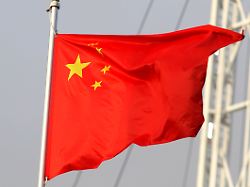New economic worries
How deep is China in deflation?
November 9, 2023, 3:42 p.m
New signals are coming from China that could prove to be a burden on the global economy. In October, consumer prices fell slightly over the year, and producer prices even fell significantly. Experts now see the government forced to intervene.
Inflation in China is ebbing, raising concerns about the recovery of the world’s second-largest economy. This increases the risk of a price decline across the board – i.e. persistent deflation, which could slow down the economy. In October, consumer prices were on average 0.2 percent below the previous year’s level, data from the National Bureau of Statistics (NBS) showed. The decline was steeper than economists expected at 0.1 percent, after stagnation in September. Producer prices, which are considered precursors to general inflation, even fell by 2.6 percent as of October 2022.
“The data shows that fighting persistent disinflation amid weak demand remains a challenge for China’s policymakers,” said chief economist Bruce Pang at financial services provider Jones Lang Lasalle. Experts understand disinflation to mean that the rise in consumer prices slows down, while prices fall during deflation. Pang emphasized that a package of measures is now necessary to protect the economy from a drift in inflation expectations. Because that could jeopardize the mood of companies and the purchasing mood of households.
China: There is no deflation
Authorities have repeatedly downplayed the risks. “There is no deflation in China and there will be no deflation in the future,” a statistics bureau official said in August. With such a price decline across the board, a downward spiral sets in. Because consumers are speculating that prices will continue to fall and are holding back on purchases. This in turn slows down the business of companies, which in turn hold back on investments and hiring. This vicious circle can put a lasting strain on an economy. Japan has had these problems for decades.
One reason for China’s falling inflation last month was that pork prices fell by around 30 percent due to oversupply and weak demand. However, so-called core inflation, which excludes volatile food and energy prices, also slowed from 0.8 percent in September to 0.6 percent in October.
China’s government and the central bank have decided on several economic measures in recent months to stabilize the economy, which has been hit by the Corona crisis. But an ongoing real estate crisis and the weak global economy are slowing down the economy.
